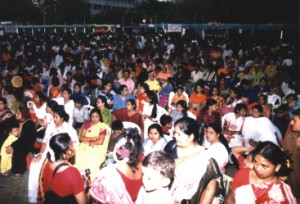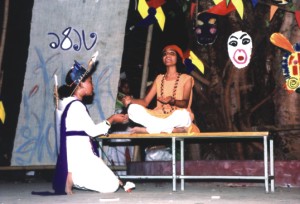|
Culture
Prakritojan Projanma Promoting Folk Traditions for the Young
 |
Through masks based on folk motifs, and folk literature, Prakritojan Projanma tries to make kids be more interested in their own cultural traditions. |
Celebrating the distinct seasons of the year is perhaps the most obvious way that Bangalis have preserved their cultural identity and Pahela Boishakh -- the first day of the Bangla calendar is the most important. Students of the Institute of Fine Arts or Charukala as it is more popularly known, have always carried on the tradition of putting up a grand show of cultural activities during the various Bangali festivals. The elaborate and vibrant masks created by the students on occasions like Pahela Boishakh have always attracted huge crowds. Another group of cultural enthusiasts called Prakritojan Projanma have, since last year, begun a tradition of organising mask festivals but also included their own ideas to make them unique. They are a group of individuals who have made it their responsibility to preserve the folk traditions of this region and revive a cultural storm among the country's younger generations. Folk tales like "Thakurmar Jhuli" and
 |
The festival has been met with great enthusiasm from children and their parents. |
"Dalimkumar" and nursery rhymes like "Ghumparani Mashipishi" were once part and parcel of growing up for most Bangalis. Now with the overpowering influence of foreign cultures through the electronic media and English medium education, many young people have been left untouched by the traditional folk literature and traditions that are intrinsic to the Bangali identity. It is to fight this inevitable onslaught of foreign cultural domination or in a more positive light, to revitalise a fading Bangali folk tradition that Prakritojan Projanma has embarked upon arranging mask festivals, folk-based games and theatre. “The basic thrust behind organising such a festival has been to raise interest among children so that they can enrich themselves with elements from our folk culture which is already on the verge of collapse,” says a member of the organisation. So far the organisation has undertaken several projects that experimented with various aspects of our history, culture and legends. They have staged the plays "Satkar Gatha", an adaptation of the poems of Joy Goshyami and "Tarikhor", from Amos Tutuola's novel Ripu O Protiddhanigon. They have also promoted many installation works and conceptual art.
 |
Plays based on folk tales can be and effective way to revive interest in folk traditions. |
The enthusiastic response to last year's five-day mask festival, which was participated by many school children, has encouraged the group to arrange another one this year on a much grander scale. It includes an extensive workshop on mask-making for two age groups. Group A will be for 10 to 14 year olds and Group B will be for 14 to 30 year olds from March 23 to April 2. Students and people of any profession can participate. A workshop on drama will be arranged from April 1 to April 12. A seventeen-member team from Dhaka University's drama department as well as teams from various drama groups will take part in the mask-making workshop to explore ways in which masks are used in drama. The second phase of the festival will begin on April 13 with an opening ceremony titled : "Bangla Borsho Biday" (Farewell to the previous year) and a mask and drama festival all day long at Natyomondol Auditorium and Ground, DU. On April 14 which is Pahela Boishakh, a colourful rally will proceed from Manik Mia avenue to Lalmatia Girls High School. The day will be filled with many other events including an exhibition of masks, drama based on "Thakurmar Jhuli", folk story-telling, folk games, mime and choreography. A seminar on folk traditions and how these traditions can be revived in contemporary thinking will take place on April 25.
 |
A workshop on mask-making has been one of the most exciting components of the festival. |
--SWM
Copyright (R) thedailystar.net 2007 |
